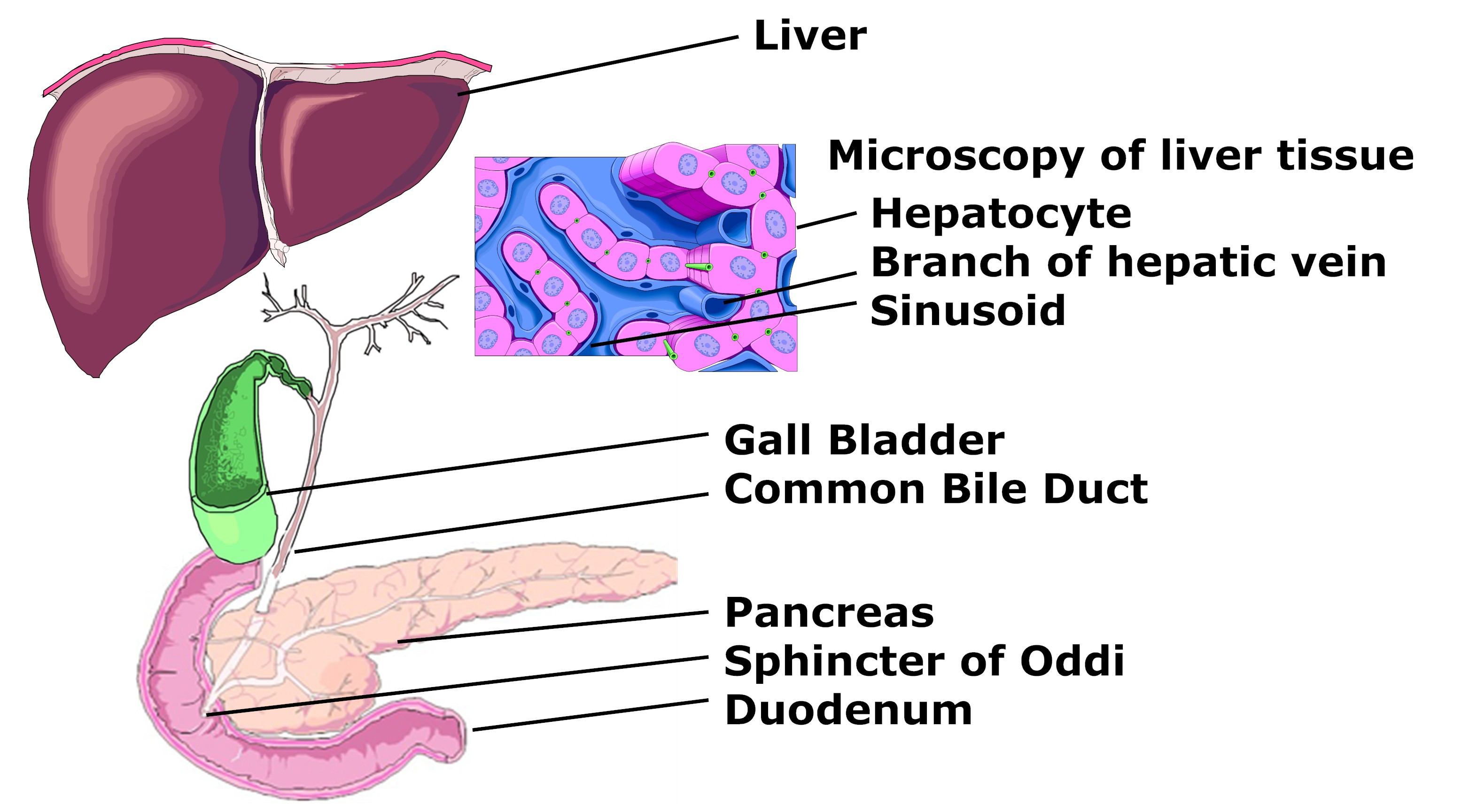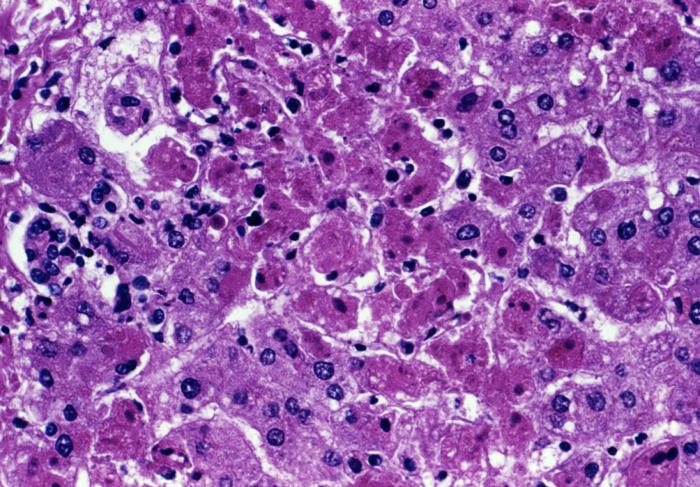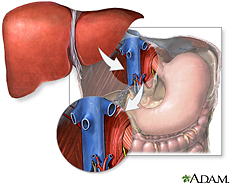Acute liver failure (patient information)
For the WikiDoc page for this topic, click here
Editor-In-Chief: C. Michael Gibson, M.S., M.D. [1]; Jinhui Wu, MD
Please Join in Editing This Page and Apply to be an Editor-In-Chief for this topic: There can be one or more than one Editor-In-Chief. You may also apply to be an Associate Editor-In-Chief of one of the subtopics below. Please mail us [2] to indicate your interest in serving either as an Editor-In-Chief of the entire topic or as an Associate Editor-In-Chief for a subtopic. Please be sure to attach your CV and or biographical sketch.
What is acute liver failure?
-
Diagram of hepatobiliary system
-
Acute liver failure from Marburg virus, a rare cause. Note hepatocellular necrosis and sinusoidal bleeding
-
Liver transplant
How do I know if I have acute liver failure and what are the symptoms of acute liver failure?
The initial symptoms of liver failure are difficult to diagnose because they can be due to any conditions. However, as liver failure progresses, the symptoms become more serious. Signs and symptoms of acute liver failure may include:
- Nausea or vomiting
- Loss of appetite
- Fatigue
- Diarrhea
- Jaundice
- Bleeding easily
- Swollen abdomen
- Disorientation or confusion
- Sleepiness, even coma
Who is at risk for acute liver failure?
- Drug-related hepatotoxicity due to acetaminophen and idiosyncratic drug reactions is the most common cause of acute liver failure in the United States.
- Acetaminophen
- Antibiotics: ampicillin-clavulanate, ciprofloxacin, doxycycline, erythromycin, isoniazid, nitrofurantoin, tetracycline.
- Antivirals: Fialuridine
- Antidepressants: Amitriptyline, nortriptyline
- Antidiabetics: Troglitazone
- Antiepileptics: Phenytoin, valproate
- Anesthetic agents: Halothane
- Lipid-lowering medications: Atorvastatin, lovastatin, simvastatin
- Immunosuppressive agents: Cyclophosphamide, methotrexate
- Nonsteroidal anti-inflammatory agents (NSAIDs)
- Salicylates (Reye syndrome)
- Oral hypoglycemic agents: Troglitazone
- Others: Disulfiram, flutamide, gold, propylthiouracil
- Viruses infectious diseases
- Hepatitis A virus, Hepatitis B virus, Hepatitis D virus, or Hepatitis E virus.
- Other atypical viruses can cause viral hepatitis and fulminant hepatic failure, including cytomegalovirus, hemorrhagic fever viruses, herpes simplex virus, paramyxovirus and Epstein-Barr virus.
- Vascular diseases
- Ischemic hepatitis
- Hepatic vein thrombosis (Budd-Chiari syndrome)
- Hepatic veno-occlusive disease
- Portal vein thrombosis
- Autoimmune disease
- Metabolic diseases
- Acute fatty liver of pregnancy
- Alpha1 antitrypsin deficiency
- Reye syndrome
- Tyrosinemia
- HELLP syndrome
- Malignancy
- Primary liver tumor: Hepatocellular carcinoma
- Secondary liver tumor: Extensive hepatic metastases or infiltration from breast cancer, lung cancer, melanoma, lymphoma, leukemia.
- Long term alcohol consumption
How to know you have acute liver failure?
- Complete blood cell (CBC) count, PT and/or international normalized ratio (INR): These tests may indicate thrombocytopenia and measures how long it takes for your blood to clot. If you have acute liver failure, your blood doesn't clot as quickly as it should.
- Hepatic enzymes: This test is to determine how well your liver function is.
- Serum bilirubin, ammonia, glucose, lactate, creatinine.
- Arterial blood gases (ABGs): These may reveal hypoxemia.
- Viral serologies
- Acetaminophen level
- Abdominal CT or MRI scan and biopsy: CT or MRI scans are often used to diagnose acute liver failure. These scans can also be used to guide biopsy and a biopsy sample is usually removed and looked at under a microscope. Tests of the liver tissue may help your doctor understand why your liver is failing.
When to seek urgent medical care?
Acute liver failure can develop quickly and life-threatening in an otherwise healthy person. If you experience either of the following symptoms, seeking urgent medical care as soon as possible:
- A yellowing of the eyes or skin
- Tenderness in the upper abdomen
- Any unusual changes in mental state, personality or behavior.
Treatment options
Diseases with similar symptoms
- Tyrosinemia
- Fructose intolerance
- B cereus toxin
- HELLP syndrome of pregnancy
Where to find medical care for acute liver failure?
Directions to Hospitals Treating acute liver failure
Prevention of acute liver failure
- Get vaccinated: Get a hepatitis vaccine or an immunoglobulin shot to prevent hepatitis A or hepatitis B.
- Eat a proper diet from all of the food groups.
- Maintain a healthy weight: Obesity can cause a condition called nonalcoholic fatty liver disease, which may include fatty liver, hepatitis and cirrhosis.
- Avoidance of alcohol abuse. Avoid alcohol when you are taking acetaminophen (Tylenol).
- Practice proper hygiene. Be sure to wash your hands thoroughly before you touch any food and after you use the bathroom.
- Don't handle any blood or blood products.
- Don't share any personal toiletry items, including toothbrushes and razors.
- If you get a tattoo or a body piercing, make sure the conditions are sanitary and all equipment is aseptic.
- Be sure to use protection (condoms) when having sex.
- If you use illegal intravenous drugs, don't share needles with anyone.
What to expect (Outook/Prognosis)?
The prognosis of acute liver failure depends on:
- The underlying cause of acute liver failure: The prognosis of acute liver failure caused by cancers is worse than other causes.
- The development of complications is the other factor that largely determines survival.
Copyleft Sources
http://emedicine.medscape.com/article/177354-overview
http://www.mayoclinic.com/health/liver-failure/DS00961
http://www.webmd.com/digestive-disorders/digestive-diseases-liver-failure
http://www.utdol.com/patients/content/topic.do?topicKey=~4RRbR6AXciyhmE#H1


